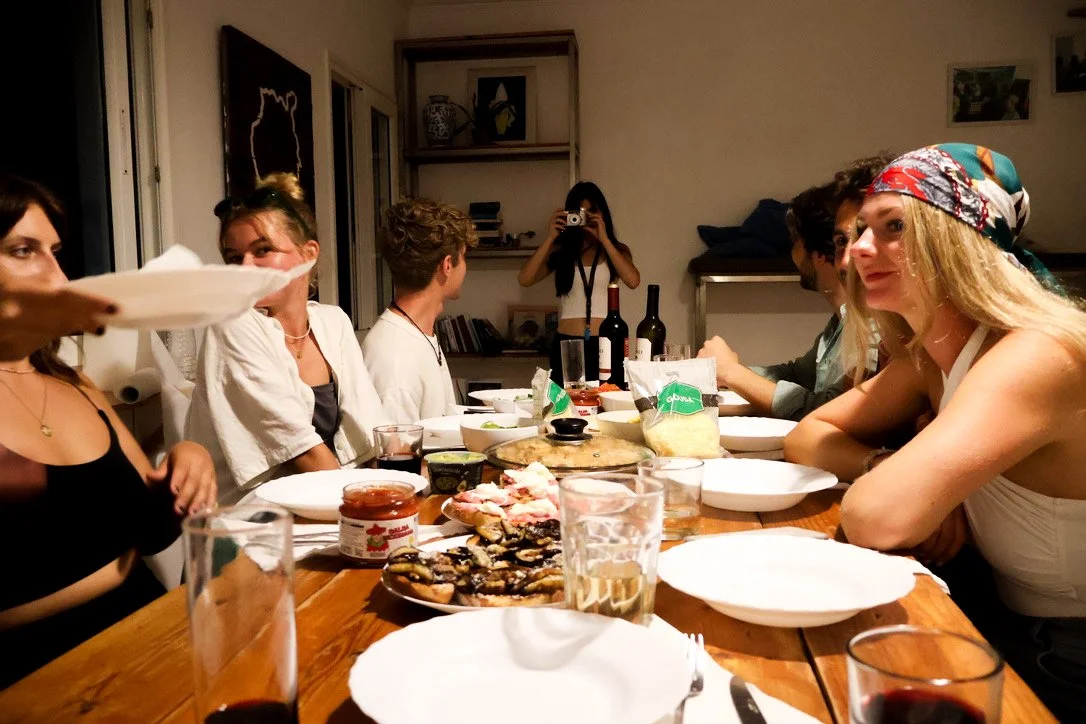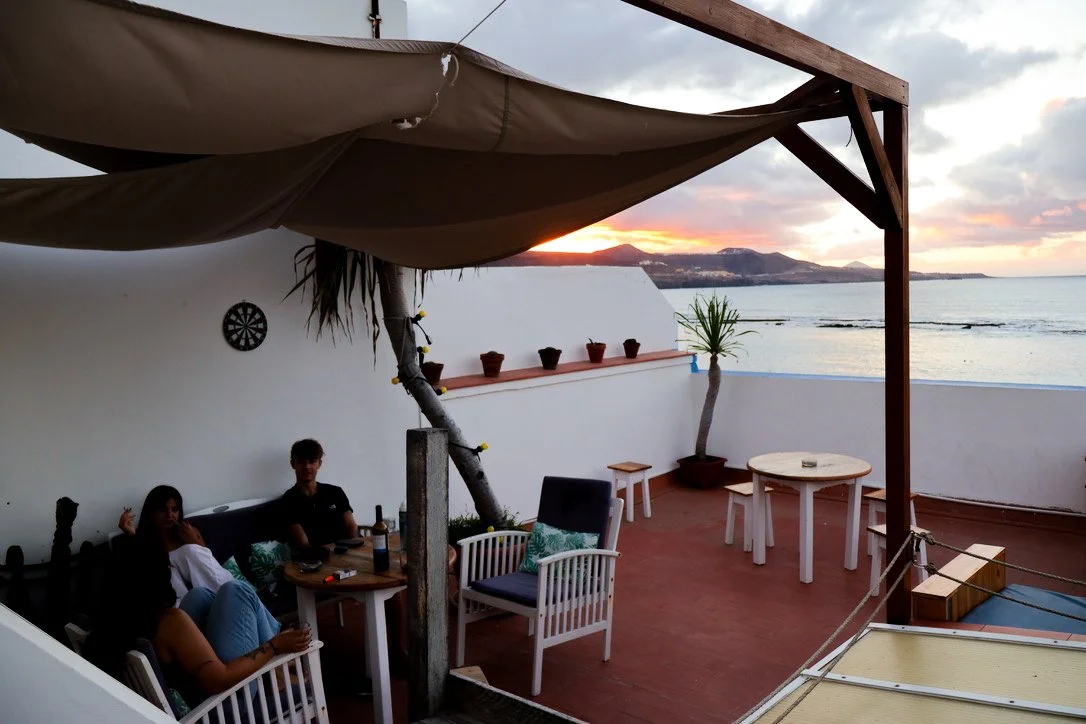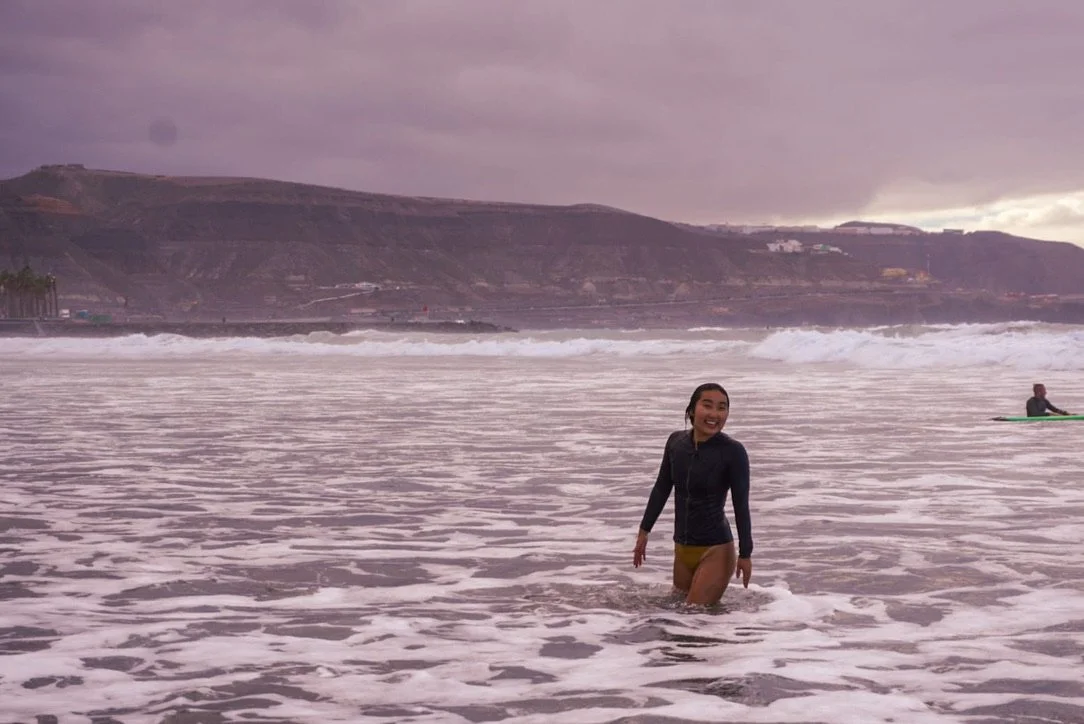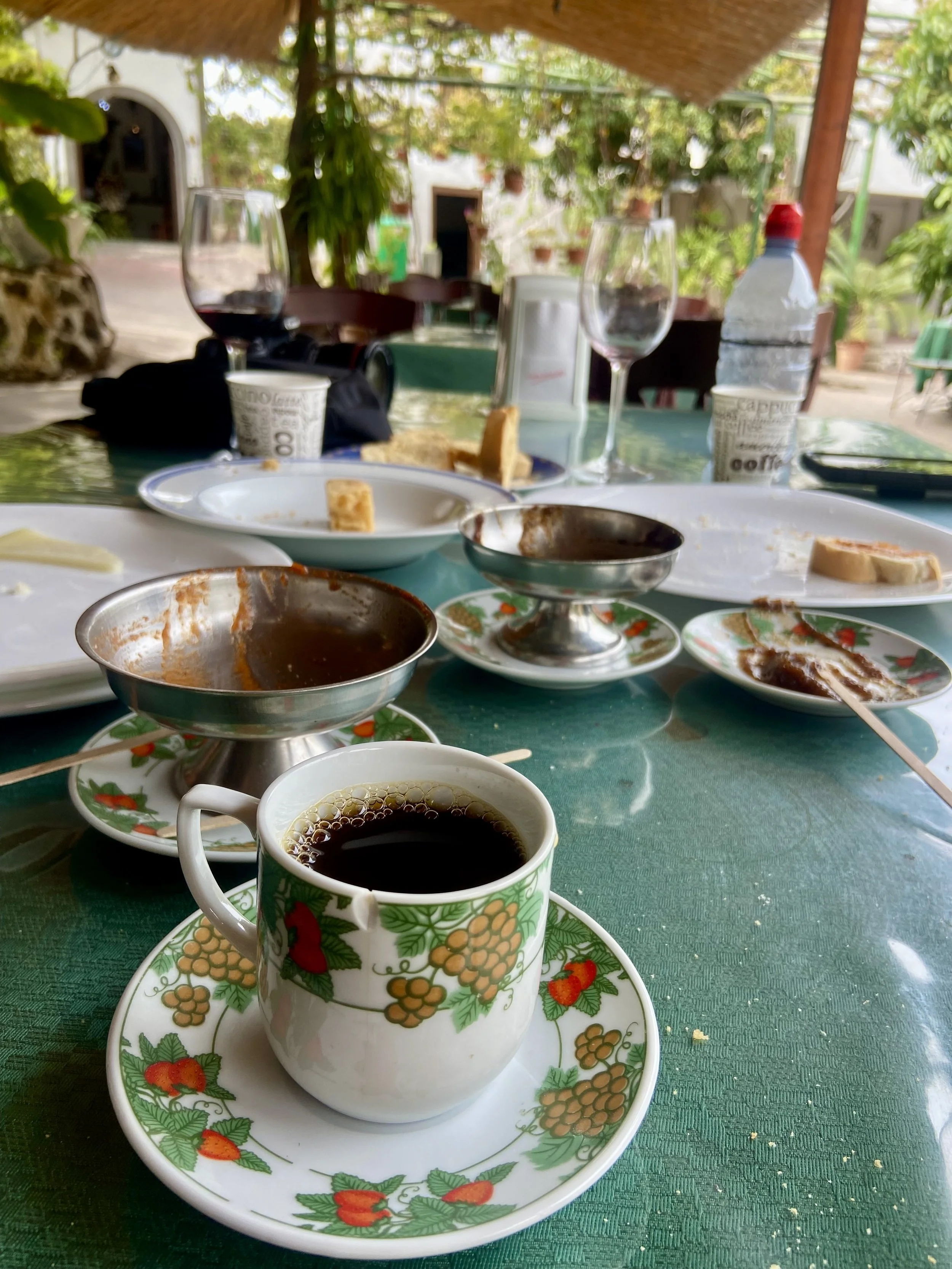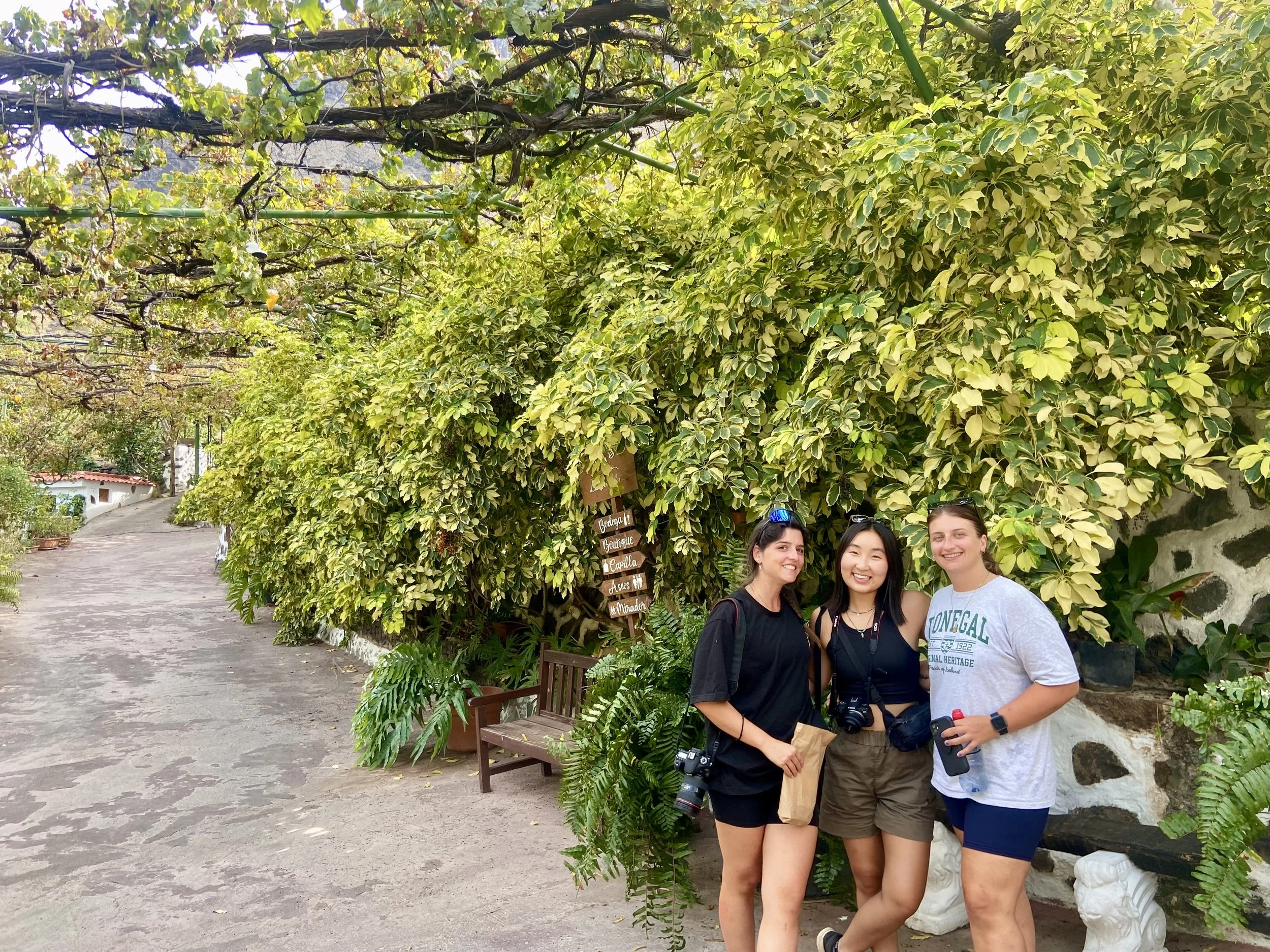The Hostel Work Exchange
October - November 2023
I had the same work schedule the entire month that I was on the Canary Islands: 3 days on, 1 day off, 3 days on, 1 day off, and so forth. However, each week, each day, was its own adventure.
When you live in a hostel, people are always coming and going, the dynamic and energy of the hostel constantly changing. One Sunday morning, you could be giving heartfelt goodbyes, to guests that became your dear friends after spending the week sharing 4 euro red wines on the rooftop terrace, to then hiding in the volunteer room that same evening, too socially drained to want to get to know the new set of guests.
The cultural influence I experienced would waver depending on who occupied the hostel and who I was spending the most time with. When Lola and Ophelie, the two volunteers from France, were staying at the hostel, I tried homemade crepes and started my mornings doing French workout videos. I also picked up some French curse words and learned that to say the word “super” in French, it was the same as in English but just pronounced with a French accent.
Then once the volunteer Andrea and some Italian guests arrived, I felt like I was in an Italian immersion program. I walked into the kitchen one evening to find Andrea and the Italian guests tirelessly and enthusiastically preparing a group Halloween dinner. One Italian was sharpening a knife, another was hand mixing a bowl for the tiramisu, and the other was chopping tomatoes for the bruschetta. The next day, I found myself along for a ride to visit the island’s Maspalomas sand dunes, and the only person in the car not passionately singing along to our driver’s Italian playlist.
It was hard to tell which guests you were going to become friends with when you checked them in. If there was a guest checking in that was staying for an extended period of time, I more closely assessed their vibe, trying to determine if this was a guest that would get along with me and the other volunteers. If there was an attractive guest that checked in, it was not uncommon for us volunteers to act like 13 year olds, hushly reporting to one another about the new hostel eye candy.
Most of the first impressions of the guests were pretty unextraordinary. When a new guest arrived, I would ring them in through the phone intercom, and wait for the guest to climb the hostel’s seemingly endless, miserable staircase to reach the kitchen and common room area. I greeted them at our front desk that stood right beside the fridge, and offered coffee or tea. After collecting their ID and payment to finish up the check-in, I gave the hostel tour spiel, explaining to guests where they could store their food, what activities were available, and the QR code to join the hostel family WhatsApp. This was a group chat where volunteers posted about hostel parties and guests could connect to do activities together.
We hosted two parties during my stay. Parties required some planning since we would invite our friends, usually other travelers we met who were volunteering at other hostels; and most importantly, because we would sell drinks at our bar. Sometime during the day, before the party, 3 of us volunteers would walk 15 minutes to Mercadona, the bigger and cheaper local supermarket. We would arrive at Mercadona with multiple empty backpacks and grocery bags, and then leave, our hands full with the now heavy grocery bags, carrying 80 euros worth of drinking supplies: gin, rum, coke, tonic water, ice, limes, and disposable cups. To make our standing bar, we emptied out the white storage shelf that held the hostel cleaning supplies, pushed the shelf out onto the rooftop terrace, and then threw a blue sun tapestry over the shelf for the aesthetic. Our makeshift bar was simple, offering only, as you guessed, gin and tonics and rum and cokes. We learned our lesson from the first party that unlimited drinks for 10 euros got a little too hectic, so for the second party we sold drinks for 3 euros, or 2 for 5 euros. All the profits would get placed in our volunteer envelope to be used as grocery money for our volunteer family dinners.
There were the guests that you ended up hanging out with, the guests who just existed and did their own thing, and the difficult guests. Some of the steps that guests took to find themselves on my difficult guest list included unnecessarily shouting my name across the hostel to get my attention, protesting the curfew when the volunteers were closing the terrace, complaining to me about the hostel not having an oven, or stealing pillows from the common area seats to use in their guest beds. The worst was when a guest handed me their dirty dishes, assuming that I would gladly wash their dishes in addition to my own, even though a sign above the sink stared at us, stating that guests were responsible for washing their own dishes.
I was only a volunteer that was receiving free accommodation for the approximately 25 hours a week that I worked. In addition to checking in guests on the fidgety laptop, the volunteers were responsible for changing the bed linens, sweeping the floor’s never-ending accumulating layer of sand, and cleaning the bathrooms and common areas. The work never felt too demanding. The hostel was small and intimate enough where it felt like I was just cleaning my own house. For the most part, I always had a general idea of everyone that was staying at the hostel. The hostel was rarely fully booked, but if it was, it could only accommodate up to 25 guests.
My favorite housekeeping activity was doing the laundry. The laundry machine and clothes line were on the rooftop patio, an area of the hostel that was blocked off from the guests by a flimsy link chain. It was therapeutic for me to hang the washed bed linens and towels on the clothes line, and carefully fold the dry items into neat piles. Jaime, the Columbian volunteer, would also be on the patio, sitting on a weathered, white plastic stack chair, with his phone in one hand and a lit cigarette in the other, taking a break from his own hostel responsibilities. Occasionally, he would look up from scrolling Spanish TikTok or video calling his friends or family, to judge me. He would shake his head and chuckle “No entiendo,” or “I don’t understand,” referring to the superfluous care that I put into folding laundry. In retrospect, I realize that taking my time with the laundry was a way for me to spend my shift hours in the guest free zone, and avoid guests’ random questions and requests. I could feel more relaxed, have one ear available in case the phone rang, or if a guest did need to hunt me down. An AirPod would be in the other ear to listen to news podcasts, or to catch up with family and friends over FaceTime.
The roof patio was also home to a giant canopy tent, that served as the sleeping spot for the guy volunteers. It was just spacious enough to fit two sleeping cots for Jaime and the other male volunteer. For the first half of my stay, this was Alan, a fellow Asian American, and then the Italian Andrea came during my second half.
Next to the patio, the female volunteers slept in a poorly lit room that resembled more of a giant walk-in closet. Brushing shoulders was inevitable if two of us tried to pass each other in between the two metal bunk beds, which creaked every time the slightest movement was made while we slept. Any floor space that was not a walkway was occupied by a wardrobe and cabinets to store our personal belongings. The cabinet shelves were overcrowded with our toiletries, sunglasses, potato chips, rolling papers, and other miscellaneous items.
I thought about how shocked my family would be if they saw the space that I was staying in. For me, I did not mind. Physically, the conditions were not ideal, but mentally, I felt safe, comfortable, and at home, because of the people that I shared the space with. In addition to Lola and Ophelie from France, I shared this tiny space with Ren from Australia and Alizee from Gibraltar.
Out of all the travelers that I met so far during my time in Europe, these volunteers I worked with were the ones I was able to most easily connect with. They felt like “my people.” It helped that all of us were around the same age, around our mid 20s. The youngest volunteer being 22 and the oldest being 29. We were young enough to occasionally want to have nights of being a little dumb and having fun, feel confused but optimistic about the ability to choose what direction we wanted to steer our lives, yet be mature enough to feel secure in our own skin and have self awareness about our boundaries.
At this point in each of our lives, we were unified by our shared desires to get out of our comfort zone and see the world. I believe that because we all sought out and ended up at the same work exchange opportunity, we held similar views on how we wanted to travel. In addition to sightseeing and being a tourist, traveling was a means by which we could also grow as individuals. Each of us had our own supplementary intentions for coming, whether that was to practice English or Spanish, add to one’s photography portfolio, improve surf skills, or learn about how hostels operated. For the majority of people I know back home, the hostel’s 4 week minimum volunteer requirement would probably be too long of a time to stay in one location, especially when restrained by understandable work, school, or other personal matters. And if they do have vacation time, they probably would not want to spend their time cleaning hostel bathrooms, but would rather be on full vacation mode, on a break from their everyday lives. For me and the other volunteers, I recognize that we were all privileged and lucky enough to find ourselves in the life and financial circumstances, that allowed us to choose to participate in this opportunity. At the same time, I believe that because we all so strongly prioritized the opportunity to deeply immerse ourselves in a new culture, we all made our own sacrifices, took some risks, and moved pieces of our lives around so that we could spend a month living on a foreign island, at a hostel, steps away from the beach.
To save money, we sacrificed comfortable sleeping accommodations, and chose to pay for our creaky bunk beds and cots with our time and labor. It helped that we all held this more frugal, budget conscious mindset. Because of our similar attitudes regarding finances, I found it easier and less stressful when it came to planning. We preferred the cheaper over the more convenient and expensive, and we were all easy-going and resourceful enough to maximize our experience, finding things to do with minimal spendings. We only went to concerts and events that were free, and if any activity did cost money, we group evaluated to determine if the experience was worth the price. None of us were picky eaters or high maintenance. We preferred to walk 30 minutes over taking a taxi, and found creative ways to cook meals together with the leftover groceries of guests that had already checked out.
I would say that all of us volunteers had high levels of adaptability and tolerance for the unfamiliar. None of us knew anyone on the island, nor had any of visited the island when each of us arrived. I came to the hostel with no expectations, and learned quickly that it was necessary continue living each day with this attitude. Making plans more than a day ahead was pointless. Since we were always surrounded by each other and the guests, our energy levels could be revitalized or sapped, depending on our momentary company or the hostel’s happenings. We had to be okay with not having a routine. If I wanted any alone time, I had to make an intentional effort to get out of the hostel. I would go on solo walks, journal at cafes, or do a workout at the calisthenic park. This open minded attitude, and willingness to welcome whatever unexpected challenges and lessons that the work exchange experience presented us, also carried over to how we approached our lives.
One of my fondest memories during my time on the Canary Islands was when Ren, Lola and I rented a car to go on an overnight getaway. A quick 24 hour trip to get away from the hostel and explore the island. It was my first week of being in Gran Canaria, and I was still on an adrenaline high, the novelty of living at a hostel and on a beach island still strong. I would catch myself grinning from ear to ear randomly throughout the day when we ate ham sandwiches by the Agaete natural ocean pools, tasted coffee and wine at a local plantation, hiked up a volcanic rock to watch the sunset at Roque Nublo, and then gazed at the Milky Way outside our rural mountain hostel.
Even the drives to each of the different locations was memorable; Ren sat in the driver seat, I sat shotgun, and Lola sat in the middle back seat, so that the three of us could more intimately converse. We laughed as we debriefed the past week’s hostel drama, and shared our thoughts on topics that universally plagued the minds of young adults, such as romantic relationships, maintaining friendships, and building careers. For me, the most significant and impressionable conversation we had was at the coffee and wine tasting plantation. While I spread the fresh apple and coffee flavored jam onto my cracker, I asked them, in one year from now (which would be October 15 2024), what country do you think you’ll be in?
Back when I was living in New York in early 2023, I had just began to tell people about my plans to move out of the city to travel. When people asked where I was planning to travel to, I had a rough idea about wanting to go to Asia and Australia, but could not give any definite answers. And then when asked what I was going to do after I finished traveling, my answer was even more uncertain.
I did not have many friends who were currently taking this more blank slate approach to their life. They had a general idea about where they were going to be, and what they were going to be doing in a year from now, whether they were furthering themselves in their respective career trajectories or continuing their studies. When I compared myself to my peers, I felt behind and doubtful about having no plan. Despite how encouraging and supportive everyone was about my plan of having no plan, I still felt self doubt. I wondered if it was unwise of me to not leverage my recent tech consulting experience to immediately find another role, and stay competitive in my field.
But I also realized I was more scared that the future Katie would regret the risks that she never took. That she would be kicking herself for always staying in her comfort zone, and not giving herself the chance to do the personal, career, and world navigation in the the way that she wanted to.
Ren finished university with a psychology degree, and was now using her EU passport to travel, work, and volunteer in Europe for about a year, or until her longing for family grew too strong that she felt it was time to go back to Melbourne. Lola was finding ways to travel by picking up an assortment of jobs like doing freelance photography and working on a sailboat, after spending 7 years working as a helicopter mechanic in the French army.
Between Lola, Ren, and I, none of us were able to answer the question of what country we thought we would be in in a year. We came from different parts of the world, from 3 different continents, but all of us were 25 year old female solo travelers equally uncertain about our futures, taking the same approach to enjoy and figure out our young lives by traveling. I was reassured from their lack of response that I was not alone in the way that I was navigating my life. The unique backgrounds of these two gals, helped remind me that outside of the friends and people I interacted with in the states, there were other 25 year olds scattered around the world with their own timelines and stories.

